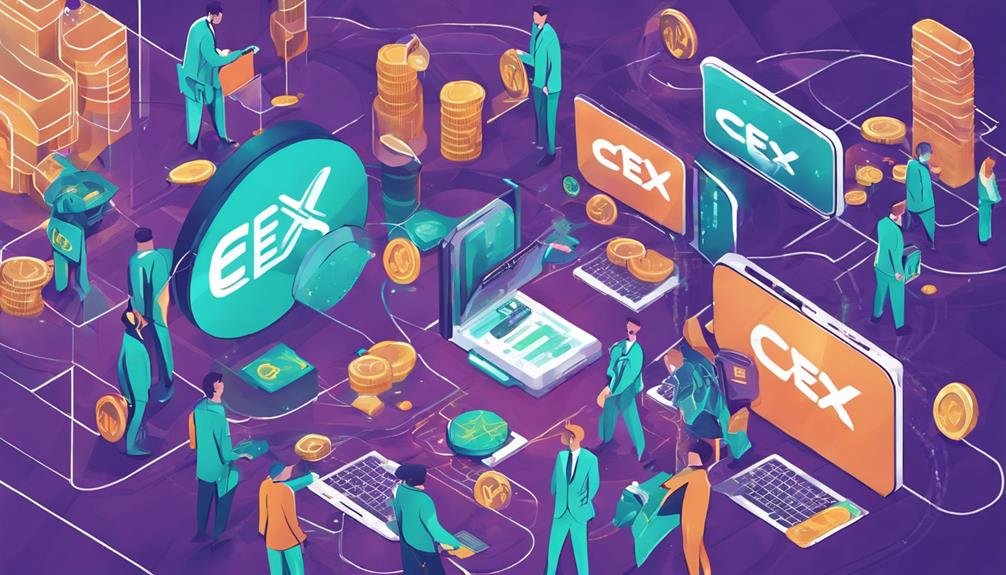Table of Contents
Brief Overview of UX on Centralized Vs Decentralized Exchanges
- DEX platforms prioritize user autonomy and self-custody.
- CEX platforms offer swift and seamless order executions.
- DEX allows for anonymous trading without KYC verification.
- DEX may experience slower order execution speeds due to network congestion.
- CEX provides 24/7 customer support for immediate issue resolution.
In decentralized exchanges (DEX) versus centralized exchanges (CEX), significant user experience distinctions are worth noting. CEX platforms prioritize user-friendly interfaces, while DEX platforms have a steep learning curve but focus on accessibility and usability, with AMM features simplifying trading. DEX allows for anonymous trading, bypassing the KYC requirements of CEX, and offers swift account initiation.
Despite slower order execution speeds influenced by network congestion and gas fees on DEX, CEX guarantees rapid and seamless order completions. Asset custody differs as CEX users trust the exchange, whereas DEX users retain control and minimize risks associated with centralized storage. Customer support accessibility favors CEX, with 24/7 personalized assistance compared to limited DEX support relying on community forums. The intricacies between DEX and CEX user experiences clearly show their divergent approaches, hinting at more insights.
User Interface Variances
When comparing decentralized exchanges (DEX) to centralized exchanges (CEX), you will notice distinct user interface design and functionality differences. CEX platforms typically offer user-friendly interfaces, making it easy for you to navigate with familiar trading layouts. On the other hand, DEX platforms may initially present a steeper learning curve due to their unique trading mechanisms and decentralized nature.
However, DEX platforms continuously enhance user experience by focusing on accessibility and usability. They introduce innovative features like automated market makers (AMMs) to streamline trading processes and provide direct control over your funds, emphasizing self-custody and autonomy in your trading activities. This direct control over funds gives you a sense of security and ownership, allowing for a more personalized trading experience. As you explore DEX platforms, you will find that they prioritize your autonomy in trading while offering advanced features that cater to your evolving needs.
Account Verification Processes

Moving from the differences in user interface design between decentralized exchanges (DEX) and centralized exchanges (CEX), let’s explore the account verification processes in detail. Decentralized exchanges like DEX often enable users to trade without extensive KYC procedures, allowing for anonymous trading. On the other hand, centralized exchanges (CEX) commonly require users to undergo KYC verification, which involves submitting personal information and documents for account verification purposes.
While DEX users can swiftly start trading without the hassle of creating accounts, CEX users must complete the account verification process before gaining access to trading functionalities. This process on CEX platforms may involve intricate steps such as identity verification and providing proof of address. DEX platforms prioritize user privacy by minimizing the collection of personal information, leading to a simpler account verification process than CEX, where stringent verification procedures are often in place.
Order Execution Speeds

Decentralized exchanges (DEX) often experience slower order execution speeds than centralized exchanges (CEX) due to the inherent nature of blockchain transactions. When you trade on a DEX, here’s what to expect:
- Delayed Transactions: DEX platforms may take longer to process your orders due to blockchain verification times, unlike CEXs, which offer instant execution.
- Impacted by Network Congestion: During times of high activity, network congestion can further slow down order executions on DEX, affecting your trading experience.
- Consideration of Gas Fees: Gas fees on DEX can influence the speed of order execution. Higher gas fees can prioritize your transaction, but they also add to the overall cost of trading.
While centralized exchanges like CEXs provide swift and seamless order executions, DEX users should be prepared for potential delays influenced by network conditions and gas fees. Understanding these differences can help you navigate the trading experience on both types of platforms effectively.
Asset Custody and Security

In asset custody and security, the contrasting approaches of centralized exchanges (CEX) and decentralized exchanges (DEX) greatly impact user trust and control over their holdings. When utilizing a CEX, users entrust the exchange to store and safeguard their assets in centralized wallets. This reliance introduces a counterparty risk where funds are vulnerable to hacking threats due to centralized storage.
On the other hand, DEX users experience a higher level of security as they retain direct control over their assets. Transactions on DEX occur peer-to-peer through smart contracts, eliminating the need for centralized authority in custody. This decentralized approach prioritizes user autonomy and minimizes the risks associated with centralized storage. In the event of security breaches, CEX users are at a higher risk of significant losses than DEX users, who benefit from decentralized storage mechanisms. By choosing between CEX and DEX, users can tailor their trading experience based on their preferences for security and control over their cryptocurrency holdings.
Customer Support Accessibility

Customers on centralized exchanges benefit from immediate assistance options like live chat and phone support when accessing customer support. In contrast, decentralized exchanges (DEX) have limited customer support accessibility, potentially impacting the overall user experience. Here’s how the two differ:
- Centralized exchanges (CEX) often provide 24/7 customer support services for immediate resolution, ensuring users can quickly address concerns.
- Due to the decentralized nature of these platforms, DEX users may need to rely more on community forums or online resources for assistance, which can sometimes lead to longer resolution times.
- CEX platforms prioritize personalized support by offering direct assistance through various channels, enhancing the overall user experience with tailored solutions to individual problems.
Frequently Asked Questions
What Are the Key Differences Between Centralized CEX and Decentralized DEX Exchanges?
When comparing centralized exchanges (CEX) and decentralized exchanges (DEX), you’ll notice differences in liquidity pools, user control, security measures, smart contracts, trading fees, asset listing, governance models, order matching, privacy concerns, and regulatory compliance.
Which Is Better, CEX or Dex?
In the world of trading, you hold the power to choose what suits you best. CEX brings high liquidity and advanced features, while DEX offers privacy, lower fees, and unique tokens. Your call, your trade.
What Is the Difference Between Centralized and Decentralized Platforms?
In centralized platforms, you have less user control and transparency benefits compared to decentralized ones. Security features, regulatory compliance, and liquidity options differ. User anonymity is higher in decentralized platforms. Trading speed may vary. Smart contract functionality and custodial risks differ.
Why Is Decentralized Exchange Better Than Centralized Exchange?
In decentralized vs centralized exchanges, decentralization outshines by empowering users with control, freedom, security, trust, privacy protection, and reliability. Embrace the innovation, efficiency, and community engagement of peer-to-peer trading.
Conclusion
In summary, the differences between decentralized and centralized exchanges are vital for users to understand. Decentralized platforms offer a more user-friendly interface, while centralized exchanges may have a quicker verification process. Regarding order execution speeds, decentralized exchanges may need to catch up to their centralized counterparts. Asset custody and security are key factors, with decentralized exchanges offering more control over funds. Finally, customer support accessibility varies, with centralized exchanges typically providing more immediate assistance. Choose wisely based on your priorities and needs.




